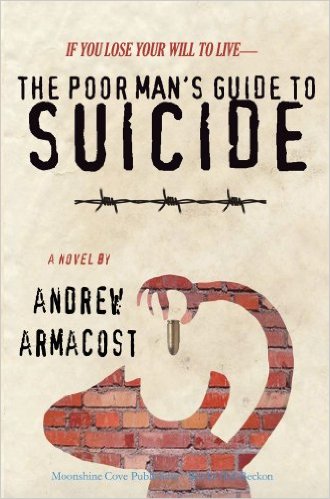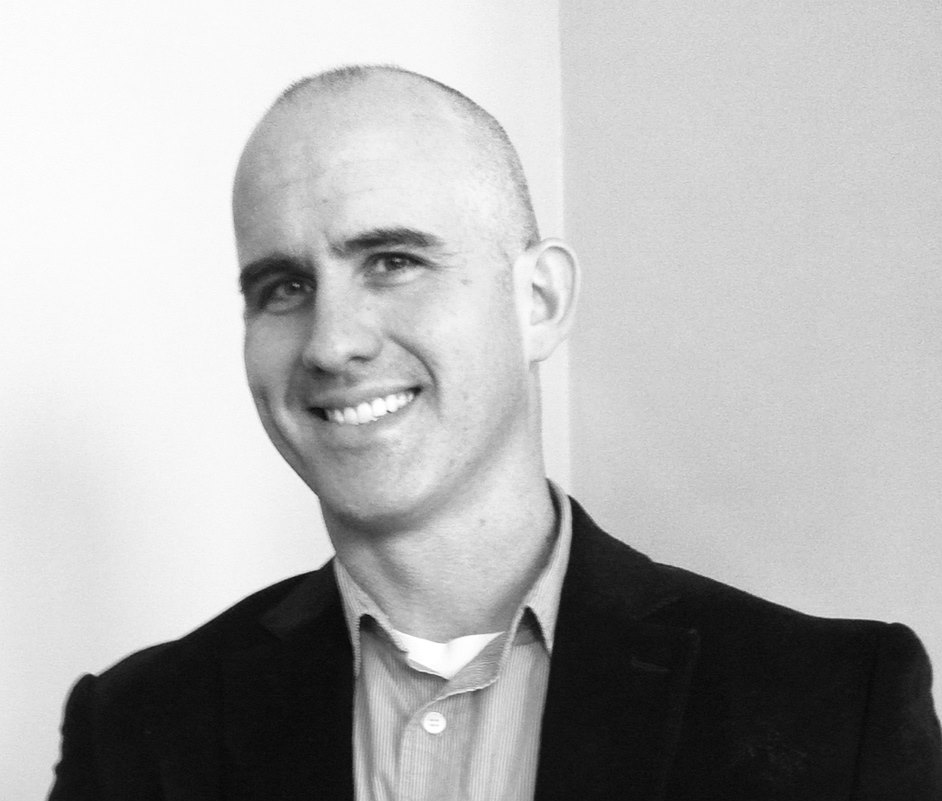From the Book Jacket
If you lose your will to live…Wesley Weimer, a twice-divorced prison guard and failed father of two, realizes his life has grown lifeless. Child support payments suck him dry and he’ll never finish that degree. Most of his free time is spent tending to his crippled mother or else writhing through painful visits with his children. So with Christmas right around the corner, Wesley persuades a prisoner to strangle him for ten thousand dollars — this way, at least his kids can cash in on the life insurance. The only problem is, he doesn’t have ten thousand dollars…
 TITLE: The Poor Man’s Guide to Suicide
TITLE: The Poor Man’s Guide to Suicide
AUTHOR: Andrew Armacost
PUBLISHED: 9-May-2014
PUBLISHER: Moonshine Cove Publishing, LLC
GENRE: Contemporary Fiction > Humor & Satire
AMAZON: The Poor Man’s Guide to Suicide
WORKS: Andrew Armacost
4* AFTER PROMISING A colleague I’d read and review Andrew Armacost’s novel, it distressed me to see it categorized on Amazon as ‘humor’. For those of you who follow me on social media, you know I lean toward what I write — mystery, thriller, suspense. YA, fantasy, and Sci-Fi sometimes get a whirl, typically when there’s a ‘mystery’ element.
I’d heard that Kirkus wrote a positive review and featured it in their magazine. They’re a tough nut to crack, and Portland Book Review awarded it 4.5*. But I don’t peruse editorial reviews until I read the book and form my own opinion. My finger hovered over Buy now with 1-Click. I considered the long list of titles on my calendar. The ‘dark, gritty noir writing’ proclamation in the product description sounded hopeful. After all, there isn’t much slapstick humor in a prison setting.
A friend of mine is a Federal Correctional Officer. Until it closed in 2013, he worked at the Kingston Penitentiary, Canada’s famous maximum-security prison. ‘Famous’ because of the notorious prisoners it housed. There are difficult professions in the world, and gatekeeper to serious offenders ranks near the top. Spending hours a day with deprived minds that represent the decay of humanity isn’t a fun job.
The prison guard angle intrigued me, so I pressed the purchase option and loaded up my eReader. I was in for a treat.
Wesley is an unhappy Indiana prison guard who lost the woman he loves and seldom see his daughter. Worse, his disastrous second marriage left his ex-wife to raise their son as a miserable, entitled troll. Child support is bleeding poor Wesley dry. Left to live on pennies in a dilapidated garage, Wes believes he has the perfect solution: a large insurance policy for his children and medically fragile mother to share, and a self-procured convict attack to end his life.
Written first-person through the eyes of Wesley, the self-effacing humor and dry wit creates an endearing character. Life is not always roses and sunshine is a theme that authors can beat to death. However, the story unravels in an informal fashion, without morphing into a didactic lesson on how we’re a product of the choices we make. The portrayal of Wesley’s poor decisions and his plan to eradicate himself from his circumstances is honest and endearing, creating an emotion link between the reader and protagonist.
Following Wesley’s psychological journey as he navigates a web of his own making is human and realistic. By developing an intelligent character, Armacost accentuates satiric humor to illustrate shifting emotions without creating a self-aware caricature. The juxtaposition of Wesley and his best friend ‘Coop’ shows the emotional danger in self-comparison and supports the plot. When Coop’s life takes a downward swing, Wesley finds himself in a position to help, with the added benefit of securing the funds required to execute his plan. Only one problem: he’s having second thoughts about “overriding the program for survival”.
Armacost did not take literary licence with his depiction of Wesley’s journey into depression. He stayed true to the character, weaving Wes’s laconic wit across the plot. His knowledge and research on correctional institutions is impressive. The atmosphere within the facility and across Wesley’s environment plays a significant role in delineating the character’s growing desperation.
So why didn’t I give it five shiny stars? The dialogue is weak in places, such as a scene with Wes’s father. Their conversation is stiff and awkward, which is jarring when compared against the protagonist’s free flowing inner musings. Spots of overdone narrative drag the pace, and dangler flashbacks create confusion. There are a few continuity issues, such as being too drunk to stand but somehow managing to meander out, find the car, and drive without happenstance. And… there are typos, which drives me nuts. Some editing to chop the nonessential filler and a good round of proofreading would quicken the pace and tighten the structure.
Armacost has a unique voice and an interesting style. His honesty and attention to his character is solid, and his protagonist is a likable chap that readers can relate to. This is a thoroughly enjoyable story about the battle between expectation and disappointment, which I recommend.
A witty look at despair and acceptance.
INTERVIEW WITH ANDREW ARMACOST
| Lori | Thank you for talking with me. It’s exciting to have you as a featured author.
After serving in the U.S. Navy, you studied literature in Scotland. What motivated your decision to go overseas to study and why Scotland? |
| Andrew | I’ve always had wanderlust. I’m a glutton for new experiences. So especially at that age, still in my 20’s, if I was given a choice between the States and overseas, there just couldn’t be a contest.
Why Edinburgh specifically? Well, it was sort of an accident. While still in the Navy, I was in a bar in London with friends. There was a friendly, flamboyant, and extremely drunk Scotsman there…a member of the Royal Guard, working at Buckingham Palace. He told us Edinburgh was the pearl of the UK, possibly Europe, and that we simply had to go. So we did. And I fell in love with it. Edinburgh is a nearly perfect mix of new and old, of progressive notions mingled with respect for history. The people are brilliant, the architecture is stunning, and if I could find the right fit, and my wife was up for it, I would move back in second. |
| Lori | Being of Scottish descent, I’d have to agree with you, although, Canada is spiffy, too.
Working as a Correctional Officer, did you have occasion to meet people similar to your protagonist, Wesley Weimer? |
| Andrew | Absolutely. People aspire to be physicians or teachers or police officers, and so on. No one aspires to be a prison guard…it’s not an inspirational profession. It’s a job you wind up doing, not doing because you planned it. So at one end of the spectrum, you find a few folks who barely qualify to do the job, but then you also find a lot of folks who are capable of, and aspired for, something much different. It’s an interesting mix, ranging from graduate students to knuckle-draggers, and everything in between. |
| Lori | I imagine it’s an unpleasant jobs at times. For you, what was the toughest part of being a prison guard? |
| Andrew | For me, it was interacting with prisoners that probably shouldn’t be there. Prisons are stuffed with dangerous, sometimes irreversibly criminal people. But many are decent people with a mental illness or a substance abuse problem, people who should be in a different environment. It’s certainly a wild guess, but from my experience in America maybe one out of five prisoners are locked up because we closed most of our public mental institutions. They need help, not incarceration. |
| Lori | Canada has also suffered from psychiatric hospital closures. Having worked in mental health, it’s frustrating to witness people in need of help and to understand that there’s no where for them to turn.
Do you create character sketches before you write? How did your protagonist change as he grew within your story? |
| Andrew | You know, I sketch, but it’s not a formal process. I walk around the neighborhood and think about the problem, but I don’t have an Excel file listing out this or that attribute for this or that character. As for how my protagonist changed throughout The Poor Man’s Guide to Suicide, I think he identified the gap between his moral desires and his capabilities. For example, in general, people consider cannibalism an absolute taboo. Until a plane crashes and you eat your dead cousin or else die. Then it’s okay. Morality can be circumstantial. I think Wesley, the central character, he reviewed his circumstances and allowed himself enough moral flexibility to survive. Granted, it’s not pretty, but there it is… |
| Lori | The Poor Man’s Guide to Suicide doesn’t have a clear antagonist, because Wes is his worst enemy. If you were to identify your antagonist, who would it be? |
| Andrew | I think you nailed it. The antagonist here is the marriage of bad luck and bad choices. Without either, Wes could’ve persevered. Often, I think, it’s true with most human lives. Sometimes you can get by on good luck alone. Sometimes good choices can overcome bad luck. Often, when bad luck meets a bad choice, you can find yourself inching toward ruin. It’s what philosophers call the problem of “moral luck” and I find it fascinating. To provide an example…two guys meet at a bar, get drunk, and drive home; Henry makes it home just fine, and suffers only a mild hangover. Meanwhile, Jim slams into a child who was playing in the street and winds up in prison for fifteen years, riddled with unending feelings of guilt. Same choice, different consequences. I find this problem mesmerizing, the problem of moral luck. |
| Lori | How would you identify your target audience? Does it differ between books or do you typically write for a specific audience? |
| Andrew | I’m not good at this and should be. If you want to be a highly marketable author, I certainly agree that you MUST identify your audience. Unfortunately, I tend to write for myself and, after the fact, try to figure out who wants to come along for the journey. Vonnegut used to encourage authors to write for one person, just one person, with the idea being that the person you pick will both humanize and represent a certain demographic. I guess for me I think about a guy named Rob, and my wife, and another guy named Jason. All three of them being long-term friends. Each of them is educated yet not scholastic or academic in any stodgy sense, loving and warm, but open to the darker tropes of human existence. |
| Lori | Well… you just identified your target market. Expand on it, and you’re all set. If only the rest was as easy.
Speaking of your wife, you’re a proud father and husband. How do you fit writing into your life and what is the most important lesson you’d like your kids to remember as adults? |
| Andrew | I suppose the quick answer is that it doesn’t all fit. I read less than I want, I write less than I want. But I signed up for it, for parenthood, and I’m committed to it. When I’m forced to make a choice, I choose my children. As for important lessons for my kids… people compensate… they usually overcompensate, and I suppose I will too but…
Anyway, I suppose for me, the most important thing is that they embrace the notion of virtue, or imagining an ideal self and identifying those moments when there are huge spaces between who you are and who you want to be, and then actively closing those gaps. I hope they can learn to be kind without being weak. My oldest is four and my mantra has been “think of other people.” If you can just do that, just that, I think you’re halfway to a moral existence. So far, so good. |
| Lori | I agree: kids first, everything else second. It’s hard to do, but some of my best memories are the ones that happened spontaneously with my kids. If I’d been in my office, glued to my computer, I would have missed those moments.
Who are some of your favorite current authors? |
| Andrew | I keep flip-flopping between literary and bizarro authors. I just finished a work by Hemingway and now I’m reading TV Snorted by Brain, by Bradley Sands. The last great contemporary work I read was probably A Fraction Of The Whole by Steve Toltz. Then again, I really enjoyed John Dies At The End because it was literary and winsomely commercial at the same time.
I don’t know. I suppose I should distinguish between authors I adore and authors who’ve actually influenced my writing. For example, I adore most of the writings of Saul Bellow and Iris Murdoch but Irvine Welsh and George Saunders probably show through my work a lot more. I respect the Western literary canon. I also respect folks who are pushing literature near a dangerous zone, going nuts on the page and having a great time while doing so. I tend to waffle…weird/literary, literary/weird, and so on. |
| Lori | You first published The Four Pallbearers in 2000, how have you grown as a writer? |
| Andrew | My first novel is a personal and professional embarrassment because of a lack of technical proficiency, not because the story was bad. In relative terms, the ability to embarrass yourself completely as a writer is pretty new, pretty recent. Historically, if you wrote something truly bad, on a technical level, it wouldn’t be published. Today, there are loads and loads of small presses, plus the self-publishing scene, and so there are a lot fewer gatekeepers to keep you from embarrassing yourself. Reducing gatekeepers can have many positive impacts, but they’re not all 100% positive…white noise abounds, and so do opportunities to fall on your own sword. I fully embrace the honesty of my first novel—I just can’t respect it from a technical perspective. |
| Lori | I have learned the hard way to listen to my editor. If I think a bit is brilliant, and she says cut it… it goes. If I could give one piece of advice to new indie or self-published authors, it’s to hire a good editor who works in your genre. It’ll make you a better writer.
What advice do you have for new authors? |
| Andrew | Either you feel compelled to write or you don’t. It’s not something I would ever encourage anyone to force themselves to do. Writing is a solitary, anti-social, and therefore lonely activity, in many ways. And if you actually try to find an audience, you will face monster gales of rejection. So really, writing is only something you should do if you feel that you cannot stop yourself.
Now, assuming you can’t stop yourself, my advice is this….write a book. Show it to no one. Write another one. Show it to no one. Write a third. Show it to no one. Now go back to you first book. Do you still think it’s worth a damn? If so, then enter into the process of validating and editing: you will now be able to do so with more distance. If your first book is worthless, and now you know it, it’s time to revisit your second, and then your third, and so on. Now repeat the process. Don’t just write a book and send it off, ten days later (as I did, with much subsequent regret). Oh yeah, and don’t let writing get in the way of your reading–you’ll never grow, if you’re shackled to the limited traffic of your own mind. Keep reading, no matter what. Lastly, write under a pen name. It’ll make you more honest and insulate your personal life from your writing life. I now realize that I should’ve done this from the start. Too late! |
BIZARRO PULP PRESS released Andrew’s new collection of short fiction, The Bohemian Guide to Monogamy, on November 4, 2015. I haven’t read his new book, but Andrew calls it “a patchwork of interlinked short fiction” and says…
An outlandish farewell to young adulthood, to that brief period of nearly unlimited freedom. Individually, each story investigates the primal impulses that seethe beneath—and therefore threaten—all human relationships. Together, the collection forms a murky labyrinth, situated along the fault-line between love and hate.






